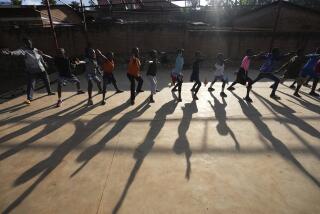Congo’s rape war
DESPITE MANY WARNINGS, nothing quite prepared me for what I heard last month from survivors of a sexual violence so brutal it staggers the imagination and mocked my notions of human decency. I cannot find the words to describe what I
heard from the girls and women in Panzi Hospital, located in South Kivu province in the Democratic Republic of Congo, near the epicenter of one of the world’s major humanitarian crises. What I do know is that I am not the same person now as when I walked into that hospital.
As a United Nations official with a special brief for humanitarian affairs, I have seen many people around the globe suffering under truly tragic circumstances. But Congo is different. Its long-running conflict has always been a brutal one, having claimed nearly 4 million lives between 1998 and 2004 -- the equivalent of five Rwandan genocides. And although the war formally ended years ago, fighting has continued in the eastern part of the country, where the national army is battling local and foreign militias in a struggle involving unresolved ethnic conflicts, regional power dynamics and the powerful tug of greed, with all sides vying for a slice of Congo’s rich mineral resources.
One of these militias is the FDLR, the Hutu ex-genocidaire group that fled from Rwanda to Congo in 1994 and that continues to harbor wider political ambitions. Civilians are deliberately targeted and harassed by these groups in a climate of almost total impunity.
From the start, sexual violence has been a particularly awful -- and shockingly common -- feature of the conflict in Congo. Women and girls are particularly vulnerable in this predatory environment, with rape and other forms of sexual abuse committed by all sides on an astonishing scale. Since 2005, more than 32,000 cases of rape and sexual violence have been registered in South Kivu alone. But that’s only a fraction of the total; many -- perhaps most -- attacks go unreported. Victims of rape are held in shame by Congolese society and frequently are ostracized by their families and communities. The ripple effect of these attacks goes far beyond the individual victim, destroying family and community bonds and leaving children orphaned and/or HIV positive.
Panzi Hospital is housed in rambling quarters outside the city of Bukavu in South Kivu. Of the 15,000 victims of sexual violence treated there since 1999, an estimated two-thirds or more are victims of the FDLR. One-third of the victims are children.
At the hospital, I met a 16-year-old girl, shy but still determined to tell her story. She had been abducted by the FDLR and held as a sex slave for months of unfathomable horrors before she managed to escape, pregnant and alone. I heard from other women who had been raped multiple times, often in front of other villagers or their families. Panzi staff members tell of a woman who was returning from working her fields when she was accosted by seven soldiers who gang-raped her. The last rapist forced the barrel of his gun inside her and pulled the trigger, literally blowing apart her genitals. We heard repeated stories from doctors and other staffers at the hospital of similar incidents involving bayonets or sticks as well as guns.
This sexual violence is an affront not only to the body but to the soul and dignity of every woman assaulted. It is a stain on everyone with influence or authority in Congolese society. Yet somehow it continues, amid widespread indifference and in a climate of impunity, with no functioning justice system to speak of. Even those few who are convicted and jailed in the attacks are likely to “escape.” Leaders of the national and provincial governments, military commanders, the Catholic Church and other religious authorities and cultural and sports figures in Congo must do much more to change the culture that allows this to happen.
In 2001, the International Criminal Tribunal for the former Yugoslavia recognized systematic rape in Bosnia as a crime against humanity and prosecuted a number of those responsible. In eastern Congo, such crimes continue unpunished. The U.N. is working with Congolese authorities to prevent sexual violence and abuse by the security forces through awareness training and the creation of more disciplined and professional units, and to strengthen the judicial and penal systems. It is also seeking to increase direct assistance to victims, ensure the recruitment of more women in the U.N. peacekeeping force and strengthen protection efforts for girls and women living in hot-spot areas. Last year’s national elections, supported by the U.N., were an important step forward and helped put an end to major fighting in much of the country, although not in the east. Since 2004, the number of displaced people has dropped from 3.3 million to 1.2 million.
But the country’s needs remain enormous. In any case, there can surely be no dignified, peaceful future for Congolese society as long as its mothers, grandmothers, sisters and daughters are subject to these most dehumanizing of crimes.
Many of those I met in Congo asked, not unreasonably, what difference my visit would make in their lives. I told them I could not promise miracles but that I would do all in my power to draw attention to their needs while pushing hard to address the political root causes of their suffering. I am committed to that. But sustained pressure is needed from around the world to make clear that this kind of shocking and appalling sexual violence must not be tolerated any longer.
John Holmes is the U.N. undersecretary-general for humanitarian affairs and emergency relief coordinator.
More to Read
Start your day right
Sign up for Essential California for news, features and recommendations from the L.A. Times and beyond in your inbox six days a week.
You may occasionally receive promotional content from the Los Angeles Times.






